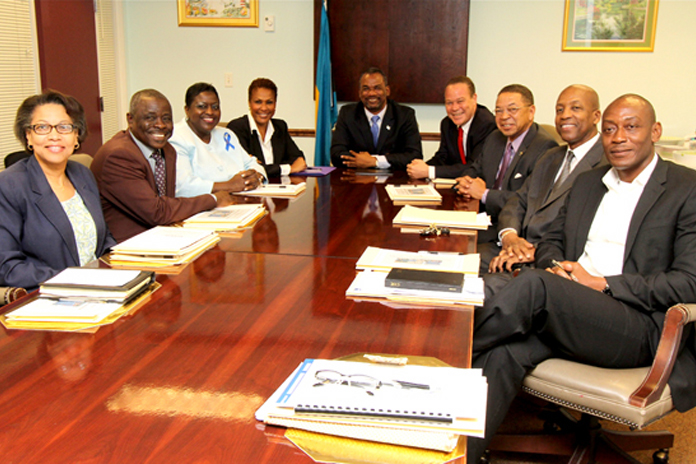
NASSAU, The Bahamas – The National Education Committee (NEC) presented its final draft policy on the “Shared Vision for Education 2030” during a press conference at the Ministry of Education, Science and Technology on Thompson Boulevard, Thursday, April 14, 2016.
The Hon. Jerome Fitzgerald, Minister of Education, Science and Technology (MOEST) described the paper as a “workable plan” for education in The Bahamas through to 2030.
The objectives of the plan are as follows:
1. To consciously and intentionally reinforce the values that our constitution speaks to;
2. To provide ongoing foundational and skills training which promotes excellence and seeks to ensure the highest level of attainment by all and;
3. To close the gap and raise the bar by making education relevant to our National Development Agenda.
Nearly two years ago Minister Fitzgerald appointed a bi-partisan committee for a “Shared Vision for Education 2030” comprising stakeholders including representatives of the Ministry of Education, the Bahamas Union of Teachers, political parties, religious groups, youth leaders and NGOs whose focus is on education.
Among those present at the recent press conference were the Hon. Hubert Chipman, MP for the St. Anne’s constituency and Opposition representative; Marcellus Taylor, Deputy Director of Education; the Hon. Melanie Griffin, Minister of Social Services; and former Education Minister Alfred Sears.
Lady Sharon Wilson, Chairperson of NEC said the terms of reference for the committee were to develop a plan for the direction that education must take and to produce a report that would be a workable and realistic plan for education through the year 2030.
In addition to participating in focused discussions, committee members were enlightened by experts on prevailing and forecasting economic and social conditions of The Bahamas and engaged in philosophical outlook on what is expected from the Bahamian system and how it should shape individuals and the society.
Mr. Chipman affirmed the Opposition’s endorsement of the Minister’s plan on the way forward for education.
“We came together, now we must work together to achieve this if we are to be successful as a nation,” he said.
Minister Fitzgerald said, “I told Ministers from across the Americas that, this is intended to become the policy document for education in The Bahamas for the next 15 years. Therefore, regardless of which political party is in power or who the Minister of Education may be, structures and programs that are meeting the needs of our children are not automatically suspended due to a change in government. This will hopefully ensure that Education is no longer a topic of political debate; or the victim of political party differences. As political leaders, particularly as Ministers of Education, we must constantly remind ourselves that although those we serve cannot vote, their future and the future of our countries depend on the decisions we make.”
He said during the last 40 years, there has been a continuous commitment by successive Governments of The Bahamas to providing quality education for its citizens. This commitment has been characterized, however, by what may be termed ‘stops’ and ‘starts’ with changes in political administration.
“It is accepted that the educational well-being of students in the Commonwealth of The Bahamas will be best served by the execution of a vision which is long-term and comprehensive, and a strategy to achieve it which is uninterrupted.”
Mr. Fitzgerald informed that the NEC has proposed a system of education which strives to encourage personal development at all ages and stages and a system which is intentional in accounting for the building of character and the maximizing of the training and educational potential of each child who becomes a part of it.
“The NEC has helped to objectively identify the strengths and weaknesses within MOEST and to propose policies that will support the overall educational needs of the country,” said the Minister.
“As the world over focuses on the direction of education for the next 15 years, The Bahamas will do the same to ensure that those who avail themselves of the public education system graduate with the skills and knowledge to become productive citizens who are able to contribute to the growth and development of The Bahamas.”
Minister Fitzgerald implored future Ministers of Education to realize that continuity is absolutely essential for the success of the education system.
He saluted the hardworking individuals within the MOEST who have helped to create a curriculum and programmes that all can be proud of.
The Minister acknowledged the Hon. Hubert Minnis, Leader of the Opposition, for his support and Mr. Chipman and Mr. Carl Bethel, who represented the Opposition on the committee. He also thanked the Attorney General, the Hon. Allyson Maynard-Gibson; Dr. Bernard Nottage, Minister of National Security; Minister Griffin; the Hon. Glenys Hanna-Martin, Minister of Transport and Aviation and Mr. Branville McCartney of the Democratic National Alliance.
The public is invited to attend a series of Town Hall Meetings, which are being held to ensure that their concerns are heard and they are active participants in the process. The public consultation period spans five months and ends in September.
The draft policy will be posted to MOESTs website www. ministryofeducationbahamas.com , on the Government of The Bahamas’ website and on MOESTs Facebook page at Facebook search Ministry of Education Bahamas. The public is also invited to submit emails to sharedvisionforeducation2030@ moe.edu.bs.







